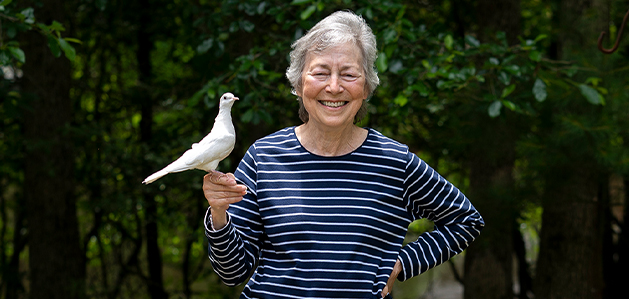The HPV Vaccine: A Powerful Shield Against Cervical Cancer
Learn about HPV, its link to cervical cancer, and how vaccines can protect against infection. Discover why early vaccination and regular screenings are vital for prevention.

By Leona Chang, DO, FACOOG, Gynecologic Oncologist, Virtua Gynecologic Oncology
As parents, we want to do everything we can to protect our children. That's why it's important to understand the power of the HPV vaccine.
HPV, or human papillomavirus, is a common virus that can cause a variety of cancers, including cervical cancer. But here's one good thing we know: the HPV vaccine is a safe, proven, and powerful tool in the fight against this disease.
It's the only vaccine shown to prevent cancer. And it's incredibly effective, with studies showing it can reduce the risk of cervical cancer by up to 90%.
Getting your child vaccinated is like giving them a shield against a serious disease. The best time to give them the HPV vaccine is when they're young, long before they become sexually active. This simple step can have a profound impact on their health and well-being.
Here's what you need to know about HPV and the vaccine, especially if you have children.
What is HPV?
HPV is a common sexually transmitted infection. HPV infections are so common that most sexually active men and women will get at least one type of HPV at some point in their lives.
There are more than 150 known HPV strains. Of those, more than 40 genital HPVs can cause genital warts and precancerous lesions, as well as cervical cancer. In fact, almost all cervical cancer can be traced back to an HPV infection.
In addition, studies show links between HPV and an alarming increase in other cancers, including those of the head, neck, genitals, and anus.
Genital HPV spreads through sexual intercourse or skin-to-skin contact, meaning you can contract it without engaging in intercourse. While latex condoms offer limited protection, they don't completely prevent transmission through skin-to-skin contact.
Why are there vaccines to protect against HPV?
The HPV vaccine functions like other immunizations that prevent viral infections. It specifically targets nine high-risk strains of HPV responsible for most cervical cancer cases. Research indicates that the HPV vaccine has nearly 100% efficacy in preventing both HPV infection and cervical cancer. Additionally, the vaccine may provide some protection against the HPV strains that cause genital warts.
Since 2016, HPV vaccines have been given as a two-dose series to children starting at age 9 to protect against HPV before most children become sexually active. If they miss this vaccination window, girls and young women aged 13 to 26 should still receive it. Adults between the ages of 26 and 45 may also be eligible for the vaccine under certain circumstances.
Take steps to protect yourself and your kids against HPV
- Schedule your child for HPV vaccination at Virtua Primary Care.
- Make an appointment for your annual gynecological exam and HPV vaccine if it's recommended for you. Call 844-896-6367 today.
There's So Much More to Explore
Discover expert insights, inspiring stories, health tips, and more by exploring the content below!

From Restless to Restful: How Movement Improves Sleep

5 Simple Ways to Spring Clean Your Wellness Routine

What to Expect From a Robotic Hysterectomy

When You Need A Hysterectomy Know Your Options

10 Reasons To Schedule Your Colonoscopy Today

Take Control of Incontinence, Prolapse, and Other Pelvic Floor Disorders

How Can I Prevent Bone Loss and Osteoporosis?
Is an At-Home Colon Cancer Test a Good Alternative to a Colonoscopy?

The Truth About Menopause, Weight Gain, and Belly Fat

Shedding Light on Lesser-Known Menopause Symptoms and Solutions

Debunking The Myths About Vaginal Dryness

Best Foods for Kidney Health

What Causes Food Addiction And What Are The Signs

5 Essential Winter Foot Care Tips When You Have Diabetes

Advanced Minimally Invasive GYN Surgery Puts You at the Center of Care

Your 10-Point Plan to Avoid Winter Weight Gain

Colitis Symptoms Under Control, Jennifer Is ‘Living My Best Life’

Be Fast and Spot the Signs of Stroke

Surprising Symptoms May Signal Stroke In Women

8 Key Steps to Better Blood Pressure Control

5 Back Stretches for the Work-From-Home Workweek

The HPV Vaccine: A Powerful Shield Against Cervical Cancer

How Does Breast Density Affect Your Mammogram?

Menopause: New Insights Into the Power of Hormone Replacement Therapy

How to Prevent and Treat Urinary Tract Infections

One New Heart Valve Saves Two Lives in the Tritten Family

6 Numbers Key to Keeping Your Heart Healthy

4 Easy Ways to Treat and Prevent Runner's Knee

Breast Cancer Diagnosis Inspires Catherine to Help Others

Five Mindfulness Tips That Can Help Heal Your Heart
Working from Home? Take a Quick Break to Stretch Your Wrists

Love Your Heart: Essential Care Tips for Every Stage of Life

How Do I Measure My Blood Pressure at Home?

How Do I Improve My Cholesterol Levels?

3 Ways to Reduce Your Stroke Risk

How the Unique Stages of a Womans Heart Affect Her Health

Sarah Wins Back Her Health After Crohn's Disease Diagnosis

Put Your Mammogram Appointment on the Top of Your To-Do List
Firefighter's Successful Lung Cancer Care at Virtua

A Breast Self-Exam Saved Kristen's Life

How Sex Keeps You Healthy as You Age

Protect Your Child From HPV and Related Cancers

Why IUDs Might Be The Most Effective Birth Control

5 Things You're Too Embarrassed to Tell Your OBGYN

4 Not-So-Crazy Questions to Ask Your Doctor

What to Know About Cervical Cancer Screenings
6 Tips for an Easier Colonoscopy Prep

Rectal Cancer Surgery Gets Eileen Back to her Magical Life | Virtua Health
Robotic Surgery Helps Shelly Haney Return to Her Happy Place

